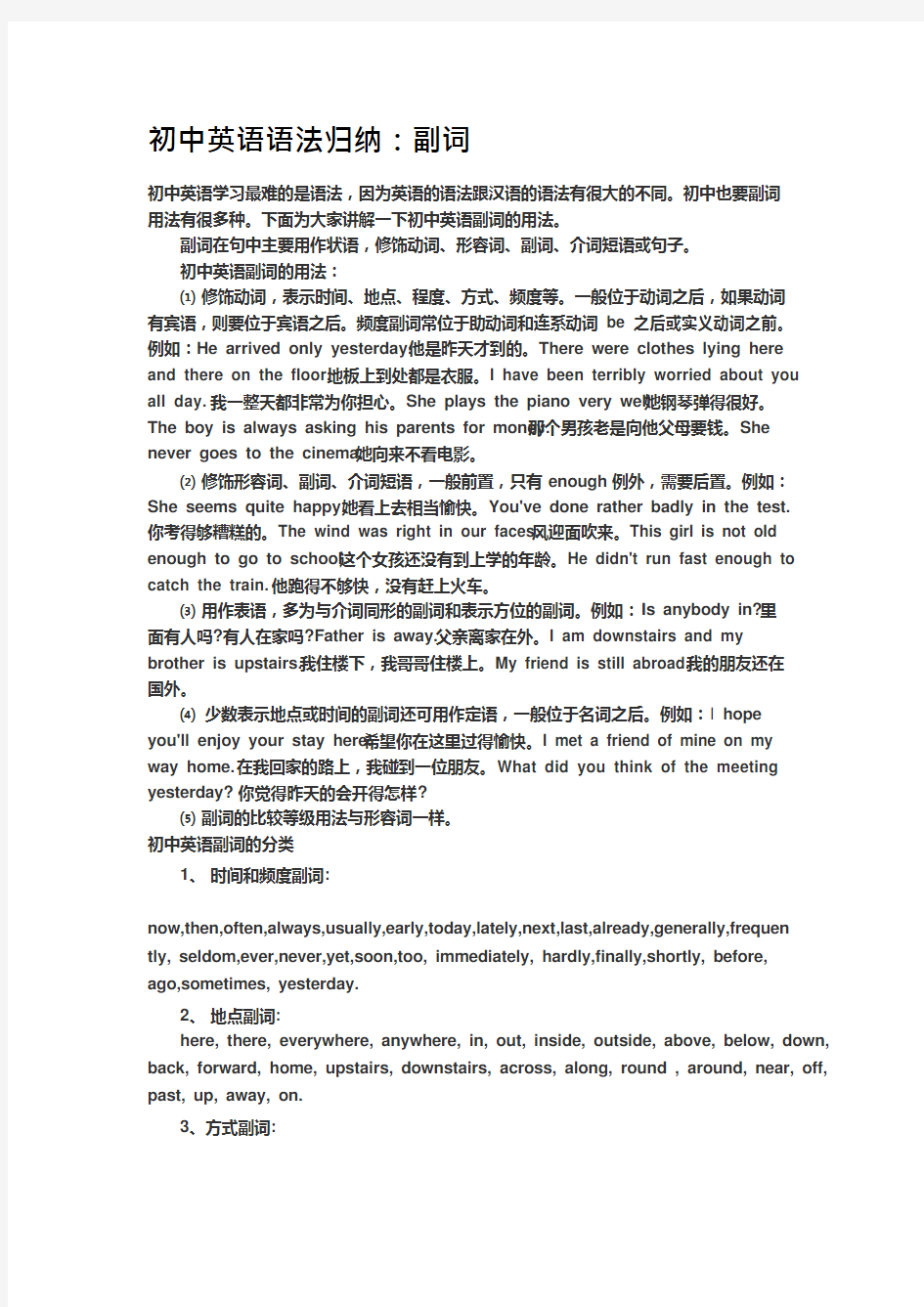(完整版)初中英语语法归纳(副词)

- 1、下载文档前请自行甄别文档内容的完整性,平台不提供额外的编辑、内容补充、找答案等附加服务。
- 2、"仅部分预览"的文档,不可在线预览部分如存在完整性等问题,可反馈申请退款(可完整预览的文档不适用该条件!)。
- 3、如文档侵犯您的权益,请联系客服反馈,我们会尽快为您处理(人工客服工作时间:9:00-18:30)。
初中英语语法归纳:副词
初中英语学习最难的是语法,因为英语的语法跟汉语的语法有很大的不同。初中也要副词用法有很多种。下面为大家讲解一下初中英语副词的用法。
副词在句中主要用作状语,修饰动词、形容词、副词、介词短语或句子。
初中英语副词的用法:
⑴修饰动词,表示时间、地点、程度、方式、频度等。一般位于动词之后,如果动词有宾语,则要位于宾语之后。频度副词常位于助动词和连系动词be 之后或实义动词之前。例如:He arrived only yesterday. 他是昨天才到的。There were clothes lying here and there on the floor. 地板上到处都是衣服。I have been terribly worried about you all day. 我一整天都非常为你担心。She plays the piano very well. 她钢琴弹得很好。The boy is always asking his parents for money. 那个男孩老是向他父母要钱。She never goes to the cinema. 她向来不看电影。
⑵修饰形容词、副词、介词短语,一般前置,只有enough 例外,需要后置。例如:She seems quite happy. 她看上去相当愉快。You've done rather badly in the test.
你考得够糟糕的。The wind was right in our faces. 风迎面吹来。This girl is not old enough to go to school. 这个女孩还没有到上学的年龄。He didn't run fast enough to catch the train. 他跑得不够快,没有赶上火车。
⑶用作表语,多为与介词同形的副词和表示方位的副词。例如:Is anybody in? 里面有人吗?有人在家吗?Father is away. 父亲离家在外。I am downstairs and my brother is upstairs. 我住楼下,我哥哥住楼上。My friend is still abroad. 我的朋友还在国外。
⑷少数表示地点或时间的副词还可用作定语,一般位于名词之后。例如:I hope
you'll enjoy your stay here. 希望你在这里过得愉快。I met a friend of mine on my way home. 在我回家的路上,我碰到一位朋友。What did you think of the meeting yesterday? 你觉得昨天的会开得怎样?
⑸副词的比较等级用法与形容词一样。
初中英语副词的分类
1、时间和频度副词:
now,then,often,always,usually,early,today,lately,next,last,already,generally,frequen tly, seldom,ever,never,yet,soon,too, immediately, hardly,finally,shortly, before, ago,sometimes, yesterday.
2、地点副词:
here, there, everywhere, anywhere, in, out, inside, outside, above, below, down, back, forward, home, upstairs, downstairs, across, along, round , around, near, off, past, up, away, on.
3、方式副词:
carefully, properly, anxiously, suddenly, normally, fast, well, calmly, politely, proudly, softly, warmly
4、程度副词,放在被修饰词之前:
much,little, very,rather,so,too,still, quite, perfectly, enough, extremely, entirely,almost, slightly.
5、疑问副词,一般放在句首:
how, when, where, why.
6、关系副词,一般放在句首:
when, where, why.
7、连接副词:
how, when, where, why, whether.
初中也要重点副词注释:
1. as…as…常构成一些词组:as soon as…(一旦…就…), as well as…(同样), as+形容词/副词+as possible(尽可能……地)。如:Please ring me up as soon as you get to Beijing.(请你一到北京就给我写信。)/ Miss Gao hurried to the school gate as quickly as possible.(高小姐尽快地赶到了校门口。)
[注释] "as long / much as + 名词"可以表示"长达/多达…"的含义。如:The house costs as much as five hundred thousand yuan.(那幢房子花费高达50 万元。)/ They stayed in the cave(ft洞)as long as two weeks.(他们呆在ft洞里长达两周。)
2. later、after、ago、before 的用法:①"一段时间+later/ago"分别表示"(多久)以后/以前",主要用于过去时态。②"after/before+某个时刻"分别表示"在某时刻之后/之前",此时两个词是介词。③ago 与before:ago 只能用于过去时,before 用于完成时。如:He had an accident a week ago.( 一周前出了一个事故)/ Some years later, the boy became a very famous singer.(数年后这个男孩成了著名的歌唱家)/ Have you been there before?(你从前到过那儿吗?)/ After a few years he gave up smoking.(过了几年他戒了烟。)
3. above、below、over、under 的用法:在上下方用above 和below,在高低处用over 和under.如:The stars are high above in the sky.(星星高挂在空中) / A plane flew over quickly.(一架飞机从头顶飞过。)
当above、below、over、under 是介词性质时,意义相似。
4. too、also、either、nor 的用法:too("也")用于肯定句和疑问句的末尾,且用逗号隔开;also("也")用于肯定句句子谓语动词之前;either("也")用于否定句末尾,也用逗号隔开; nor("也不")用于倒装句句首;如:Are you American,too?(你也是美国人吗?)/ He is not happy and I am not happy, either.(他不愉快,我也不。) / He didn't watch the football game. Nor did I.(他没有看足球赛,我也没有。)/ You can also find the market is very good.(你还可以发觉那个市场很好。)
5. enough、too、so、very、quite、very much 的用法:enough ("足够,十分")放在形容词或副词之后;too("太")、very("非常")、quite("相当")、so("如此地")等放在形容
